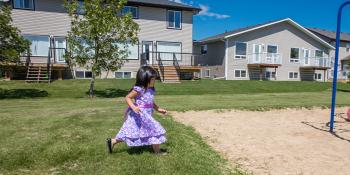
The positive impact our work has on individuals, families and communities
Carmen Smith, executive director of Jackson County Habitat in Florida, talks about seeing the results of their work in the families they serve.
In 2012, I was working with high school students, and one of my colleagues said they were putting in a new Habitat affiliate office. Although I’d heard of Habitat, I didn’t know a lot about it. But when I met some of the staff and volunteers and they explained the program, I thought, “That’s pretty great.”
Fast forward to last summer. I found out Jackson County Habitat’s executive director was leaving, and I learned as much as I could. I kept calling them daily: “Is it posted? Is it posted?” I was so excited when I got the interview but also scared, I must say. But it’s been a wonderful experience.
What I’ve come to realize is how huge housing seems to kids. It seems such a far-fetched thing to them, something for adults to worry about. Kids have a hard time finding their role in housing. So you have to figure out how to involve them.
With our homeowners, for example, you should see how kids light up to bring in their report cards, which count toward sweat equity: an hour for an A, a half-hour for a B. They’re actually involved in the process, and that means a lot to them.
Having worked in public health for a few years, I’ve seen how all aspects of life are interconnected. Our local college’s business program requires community service of their students, and I like to use that as a teaching moment.
I ask what their home environment was like, and — regardless of whether it was a great experience or they grew up in poverty and fought their way out — they start to see the importance of stable housing. Either “I did have it” or “these are the things I had to overcome.” And “how can I pay it forward to make it easier for someone else?”
When you take a step back and examine the bigger picture, you realize this is not just about someone moving into a house, it’s improving the lives of that entire family and offering a community hope.— Carmen Smith, executive director of Florida’s Jackson County Habitat
I’ll be honest that, at 26, coming to work at Habitat and being on a first-name basis with everyone was a little strange. I’d want to call them Dr. or Mr. or Ms. But there’s a level playing field, a sense that we’re all here for the same thing, whether it’s the staff, the volunteers or the family partner.
Usually, people have to try hard and stretch to make aspects of their day-to-day life and their values connect. Working at Habitat, I don’t have to.
— Carmen Smith, executive director of Florida’s Jackson County Habitat
Subscribe to our monthly newsletter
Get the latest Habitat news, volunteer opportunities, DIY tips and more ways to get involved.